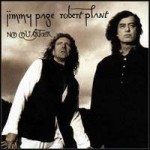I grew up with Led Zeppelin. I even remember standing in a music store in the Twin Cities in about 1970 listening to “Whole Lotta Love” from Led Zeppelin II speed around me on the latest technological breakthrough, quadraphonic stereo. (Who’d a thunk it would take home theater setups before that concept really took hold.) Yet after Houses of the Holy, released in 1973, the bombastic nature of the band seemed to wear on me as my tastes moved out of what was, at the time, “heavy metal.”
 As a result, it was with interest that I heard that Jimmy Page and Robert Plant were going to appear on “MTV Unplugged”, although in a 90-minute program called “UnLedded.” Given that, as the name implies, the “Unplugged” series traditionally presented acoustic performances, I found the thought more than intriguing. But everyone should have known that when Page and Plant got together to record the show in London on August 25 and 26, 1994, they would go far above and beyond.
As a result, it was with interest that I heard that Jimmy Page and Robert Plant were going to appear on “MTV Unplugged”, although in a 90-minute program called “UnLedded.” Given that, as the name implies, the “Unplugged” series traditionally presented acoustic performances, I found the thought more than intriguing. But everyone should have known that when Page and Plant got together to record the show in London on August 25 and 26, 1994, they would go far above and beyond.
Of course, Page and Plant had a backing band — that included a hurdy gurdy player and a mandolin player who also chipped in on bodhrán. But they also brought in an ensemble of Egyptian musicians and the London Metropolitan Orchestra. And when the show aired in October, it included material shot in Wales and on the streets of Marrakesh in Morocco. Yet the goal — which both the program and resulting CD achieved — was to display influences that were understated in the Led Zeppelin format.
The Moroccan footage and songs show the influence of world music, particularly Middle Eastern motifs and rhythms, on the two artists. The influence is also on display in the arrangement of some traditional Zeppelin tunes, such as “Friends,” “The Battle of Evermore” and “Four Sticks.” In fact, even “Kashmir,” which had a Middle Eastern influence when it was first released in 1975, has that flavor bolstered here. In fact, from my standpoint this may be the definitive version of the song, which closed the performance and even incorporated a bit of “Black Dog.”
The format and song selection of the performance also gives more opportunity to hear the range of Page’s talents. Page didn’t completely abandon his electric guitars and, in fact, used his famous double neck guitar to great effect on both “Four Sticks” and “Wonderful One,” one of the four tunes written for the show. And Page fully displays the blues that were the foundation of Led Zeppelin with his work on Zep’s “Since I’ve Been Loving You.”
As might be expected, the Led Zeppelin tunes are my favorites of the performance. Some 15 years later, I still appreciate the different take No Quarter gave on them.
I am a traveler of both time and space, to be where I have been
“Kashmir”







